⚡ZurzAI.com⚡
Companies Similar to Cambricon
Graphcore

Graphcore technology accelerates AI innovation, enabling faster experimentation and breakthroughs that enhance human potential for healthier, fairer, and more sustainable living.
Graphcore is focused on advancing the field of artificial intelligence (AI) through its innovative computing technology. Central to its operations is the development and deployment of Intelligence Processing Units (IPUs), which are designed specifically to enhance machine intelligence. By targeting industries such as finance, healthcare, scientific research, telecommunications, consumer internet, and academia, Graphcore aims to redefine how industries leverage AI for innovation, efficiency, and enhanced outcomes.
Key Focus Area: Graphcore's key focus is on providing highly specialized processing power for AI workloads. Its primary product, the IPU, is designed to accelerate machine intelligence tasks that require complex computations and large data sets. This includes applications in natural language processing, computer vision, and graph neural networks across various sectors.
Unique Value Proposition and Strategic Advantage:
- Wafer-on-Wafer Technology: Graphcore’s Bow IPU, utilizing Wafer-on-Wafer (WoW) technology, offers significant enhancements in computational power and efficiency. This novel stacking technology enables IPUs to achieve up to 350 teraFLOPS of AI compute, delivering better performance than previous models.
- Massive Parallel Processing: IPUs are structured for fine-grained, high-performance computing, with architecture optimized for AI workloads that operate in parallel. This architecture supports scalable, efficient processing needed by contemporary AI applications.
- Integration with Popular AI Frameworks: Graphcore’s Poplar software stack works seamlessly with widely-used machine learning frameworks such as TensorFlow and PyTorch, simplifying adoption and deployment.
Delivery on Value Proposition: Graphcore delivers on its value proposition through a series of meticulously developed products and services:
- Hardware Solutions: Graphcore provides scalable IPU solutions like the Bow Pod series, which ranges from small-scale exploratory systems (Bow Pod16) to large-scale deployment configurations (Bow Pod256). These systems cater to diverse computational needs from development to full-scale production.
- Cloud Connectivity: Graphcore offers cloud-based solutions, enabling businesses to access IPU technology without on-premises installations. This allows easy scalability and access to the latest AI capabilities.
- Cross-Industry Applications: By targeting key industries, Graphcore customizes its IPU offerings for specialized applications such as fraud detection in finance, drug discovery in healthcare, and even particle physics simulations in research. Each application is optimized to utilize the parallel processing power of IPUs effectively.
- Collaborative Innovations and Research Partnerships: Graphcore collaborates with major tech companies and academic institutions, facilitating the integration of its IPUs into cutting-edge projects and research initiatives that drive AI forward.
In summary, Graphcore's strategy hinges on its specialized IPU technology, which provides scalable, efficient, and robust solutions for complex AI challenges. Its innovation in processing technology and strategic partnerships positions it to meet the evolving AI demands across various global industries.
Cambricon
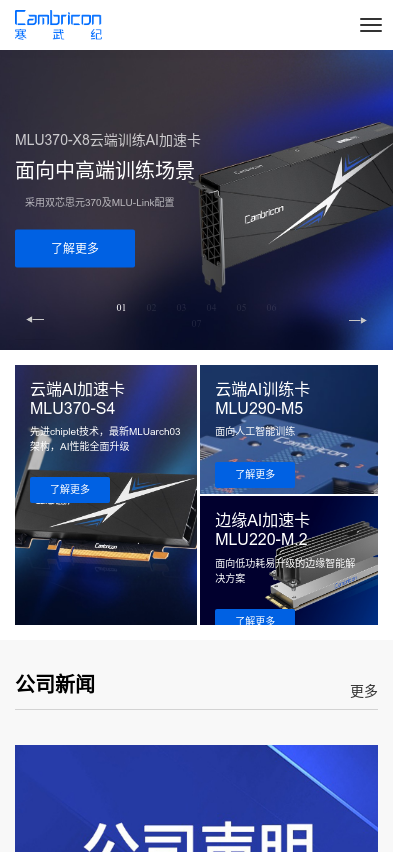
寒武纪公司发布声明警惕冒用名义进行虚假招聘,同时展示全算力产品和AI训练卡的市场实力。
- Key Focus Area
This company is primarily focused on developing artificial intelligence (AI) hardware, specifically high-efficiency general-purpose intelligent chips and acceleration cards. Their product offerings span various categories, including cloud, edge, and end-node AI processing solutions. They are heavily invested in advancing AI technology, particularly through their series of intelligent acceleration cards and systems such as the MLU370, MLU290, and MLU220 series, as well as edge computing modules and terminal processor IPs like Cambricon-1M and Cambricon-1H.
- Unique Value Proposition and Strategic Advantage
The company differentiates itself through its use of advanced chiplet technology, which allows them to package multiple AI computing units into a single chip. This approach yields high computational power and efficiency, offering more versatile and cost-effective AI chips tailored for different scenarios. Their strategic advantage lies in their proprietary MLUarch03 architecture, which enhances computation speeds and efficiencies significantly. Additionally, the integration of the MLU-Link multi-core interconnect technology allows for superior parallel processing and communication between chips and systems, enabling scalable AI training and inference tasks. The incorporation of LPDDR5 memory across their products maximizes bandwidth while maintaining low power consumption, boosting performance further.
- Delivering on the Value Proposition
The company implements its value proposition across several strategic fronts:
-
Innovative Chip Design: Utilizing advanced 7nm manufacturing processes and chiplet technology to integrate numerous transistors into compact formats, thereby maximizing computational throughput and memory bandwidth.
-
Software Ecosystem: They provide a comprehensive software development platform called "Cambricon NeuWare with MagicMind," which supports inferencing and training across their entire product line. The platform is built to facilitate seamless deployment of AI applications from development to production.
-
Scalability and Interoperability: The MLU-Link technology enhances the scalability of AI systems by providing significant cross-chip communication capabilities, which caters to distributed AI model training and inferencing. This facilitates the building of large-scale AI systems collaborating across multiple chips and accelerators.
-
Edge and Cloud Solutions: Their diverse product lineup, including edge computing modules and cloud AI acceleration cards, allows deployment flexibility across different environments, such as data centers and edge devices. They address multiple industries' needs, including intelligent manufacturing, smart finance, and autonomous vehicles.
Ultimately, this company positions its products as flexible, efficient, and high-performance solutions geared towards evolving AI computation demands across the cloud, edge, and endpoint landscapes.
CAMB.AI

CAMAB.AI enables storytelling in every language through foundational AI models, facilitating content translation and dubbing.
Camb.ai Overview
-
Key Focus Area
- Camb.ai focuses on utilizing artificial intelligence to enhance content accessibility and localization. Its core operations involve using AI models to translate and dub content into over 140 languages. The company positions itself as a provider of tools that manage multilingual content, helping a variety of clients, including media professionals and content creators, to make their materials accessible globally.
-
Unique Value Proposition and Strategic Advantage
- Camb.ai's unique value proposition lies in its proprietary AI technology that supports multilingual translation and dubbing at scale. This technology aims to transform how content is consumed, allowing for more seamless experience by removing language barriers. Their strategic advantage is rooted in partnerships with notable organizations like the Australian Open and IMAX, which enhances its credibility and reach across different sectors including sports and cinema.
-
Delivery on Value Proposition
- Camb.ai delivers on its value proposition by leveraging its AI platforms, such as DubStream for real-time multilingual broadcasting and its MARS and BOLI AI models for speech synthesis and translation. The application of these technologies spans various use cases:
- Text to Speech and Translation: Offering APIs for integrating voiceover and translation technologies into user applications, making these features more accessible to developers.
- Partnerships in Business Domains: By collaborating with key industry players like Major League Soccer and IMAX, Camb.ai has expanded its applicability in sports broadcasting and cinematic productions.
- Support for Content Creators: It assists influencers and creators, enabling them to extend their reach to new audiences by translating their content into multiple languages, as evidenced by collaborations with popular content creators.
- Camb.ai delivers on its value proposition by leveraging its AI platforms, such as DubStream for real-time multilingual broadcasting and its MARS and BOLI AI models for speech synthesis and translation. The application of these technologies spans various use cases:
Through these strategies, Camb.ai aims to expand global engagement with content, enhancing both user experience and market penetration for their clients. However, as it is self-promotional content, it's important to consider these assessments with an understanding of potential marketing embellishment.
SiMa.ai
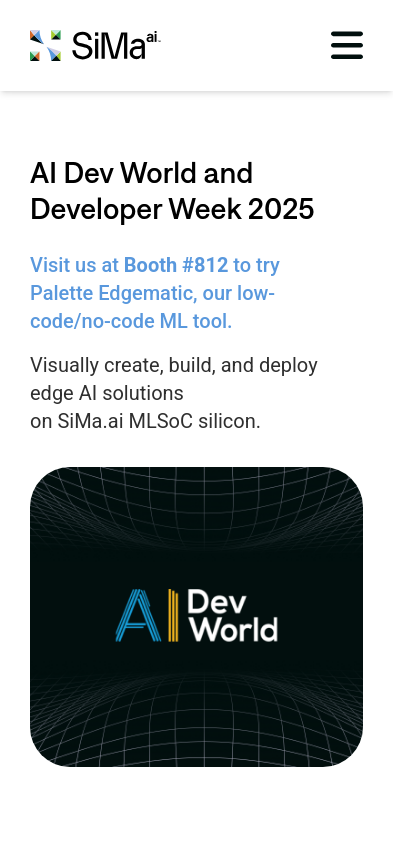
SiMa.ai creates chips for AI workloads at the edge, offering a "software-centric" platform for multimodal applications. SiMa.ai™ is a machine learning company delivering the industry’s first software-centric purpose-built MLSoC™ platform for effortless ML deployment and scaling at the embedded edge.
About | About | News | Leadership | Leadership | About
SiMa.ai is primarily focused on revolutionizing machine learning (ML) at the embedded edge. Their core offering is their Machine Learning System on Chip (MLSoC™), a purpose-built platform aimed at addressing varied computer vision challenges across multiple industry sectors, such as automotive, industrial, healthcare, drones, smart vision and retail, and the government sector.
Key Focus Area: The key focus of SiMa.ai is making ML "effortless" across diverse edge applications by providing high-performance, low-power solutions integrated within MLSoC™. With a push-button software experience, SiMa.ai targets complex scenarios in areas like autonomous vehicles, industrial automation, healthcare data processing, and smart retail, where energy efficiency and real-time processing are critical.
Unique Value Proposition and Strategic Advantage: SiMa.ai’s unique value proposition lies in their MLSoC™—a comprehensive, single-chip solution that supports a broad spectrum of models, including CNNs, Transformers, and Generative AI. Their strategic advantages include:
- Performance and Power Efficiency: Offering up to 10x better performance per watt compared to competitors, SiMa.ai addresses the industry's need for high throughput with reduced power consumption.
- Software-First Approach: By focusing on software-centric design, SiMa.ai allows for seamless, rapid deployment and iteration of ML models, making it user-friendly and adaptable for developers.
- Scalability and Versatility: Their platform accommodates future and legacy ML models, expanding its usability across multiple use cases and industries.
Delivering on Value Proposition: SiMa.ai operationalizes its value proposition through:
-
MLSoC Family and Board Solutions: Their offerings include the MLSoC Modalix, with configurations tailored for different performance needs (25 to 200 TOPS). This ensures adaptability to market demands for smart vision systems, drones, industrial automation, and smart cities.
-
Palette Software Platform: A dedicated software suite that simplifies the development, testing, and deployment of ML solutions across edge applications. This platform enables integration of custom ML solutions through a no-code/low-code approach, making it accessible and reducing the technical barrier for businesses.
-
Effortless Integration and Deployment: SiMa.ai’s solutions provide plug-and-play integration and are designed to be versatile enough to support multiple sensors and devices, all while ensuring secure data handling with built-in privacy features.
-
Strategic Partnerships: Collaborations with industry leaders like Synopsys and TRUMPF enhance SiMa.ai’s offerings in specific sectors like automotive and industrial applications, further cementing their foothold in these industries.
-
Customer-Centric Approach: Engaging actively with clients in over 50 leading companies, they strive for meticulous adaptation of their solutions to meet specific client needs.
In conclusion, SiMa.ai positions itself as a transformative player in the embedded edge ML market with its scalable, energy-efficient, and user-friendly approach ready to tackle complex computing challenges with speed and simplicity.
Leonardo.ai

Leonardo.ai is a startup focused on hyperrealistic image generation for the gaming sector, now expanding into marketing, fashion, and architecture with over 19 million users. Leonardo.AI is engaged in generative AI technologies, contributing to creativity and innovation in content creation.
About | About | About | About | About | About | About | About | About | About | About | About | About | About | About | About | About | About | About | About | About | About | About | About | About | About | About | About | About | About | About | About | About | About | About | About | About
1) What is this company's key focus area?
Leonardo.ai focuses on providing advanced AI-powered solutions to enhance creative processes across various industries. The company primarily targets the fields of image generation, animation, and video storytelling, delivering tools for creating art, illustrations, animations, and graphic design, among other applications. Their core technology allows for the conversion of digital inputs into creative outputs, whether for marketing, architecture, game asset creation, or photography.
2) What is their unique value proposition and strategic advantage?
-
Variety and Flexibility: Leonardo.ai offers a wide range of models tailored for different artistic styles and requirements, including photorealism, cinematic effects, and anime. This diverse model suite provides users with creative freedom and precision.
-
Generative AI: Their use of generative AI allows users to quickly produce production-quality assets with consistency in style and speed. This efficiency supports both large-scale collaborations and individual creators.
-
Ease of Use: The tools offered are designed to be intuitive, making complex creative tasks accessible to users with varying levels of expertise. This is a strategic advantage for industries looking to streamline workflow processes while maintaining high standards of creative output.
3) How do they deliver on their value proposition?
-
Advanced Tools and Features: Leonardo.ai provides specialized tools like the AI Canvas for detailed editing, a 3D texture generator for enriching visual content, and their AI Video and Art Generators for dynamic storytelling and illustration.
-
Custom Models for Precision: They offer a range of fine-tuned models such as Leonardo Diffusion XL for general image generation, PhotoReal for hyper-realistic photos, and specialized models like Leonardo Anime XL and Kino XL, each focusing on specific creative needs.
-
API and Developer Support: By providing an API, the company enables developers to integrate Leonardo.ai’s capabilities into their existing systems, thus allowing for tailored outputs that adhere to specific brand guidelines.
-
Collaborative Ecosystem: Leonardo.ai supports team-based or individual creative projects with a platform that encourages collaborative input. Their suite is built for business scalability, making it ideal for teams needing to bring ambitious concepts to life efficiently.
Leonardo.ai positions itself as a transformative force in creative content production by offering flexible, intuitive AI tools aimed at simplifying and enhancing the creative processes across multiple design and production disciplines.
MicroAI

MicroAI provides AI-focused solutions for various industries, offering products like Machine Intelligence, Smart Connectivity, Security and Monitoring, Digital Factory, Launchpad, AIStudio, and Gen AI Knowledge Management primarily focusing on AI capabilities, telecom solutions, cybersecurity, manufacturing optimization, and knowledge management systems.
About | About | About | About | About | About | About | About | About | About | About | About | About
MicroAI focuses on providing advanced intelligence solutions for various industries by enhancing machine and device performance through Embedded/Edge AI and Machine Learning technologies. The company targets sectors like manufacturing, telecom, automotive, finance, and infrastructure, offering solutions that extend from machine intelligence to various facets of IT and OT asset optimization.
Key Focus Area: MicroAI's key focus is on optimizing the performance, reliability, and security of machines and devices across industries. By embedding AI and machine learning algorithms at the endpoint, MicroAI aims to make machines more transparent, providing real-time insights into their operations.
Unique Value Proposition and Strategic Advantage: MicroAI's value proposition lies in its edge and embedded AI solutions, which deliver:
- Enhanced machine transparency and performance insights.
- Predictive intelligence that minimizes downtime and maximizes output.
- A reduction in operational and maintenance costs through predictive maintenance.
Strategic advantages include:
- Providing a unified AI-enabled platform that integrates seamlessly with existing machine assets.
- Offering edge AI capabilities that reduce cloud dependency and improve data processing efficiency and security.
- Advancing zero-trust cybersecurity frameworks that protect against sophisticated cyber threats directly at the endpoint level.
Delivery on Value Proposition: MicroAI delivers its value proposition through several key methods:
-
Machine Intelligence Platform: This platform enables deeper insights into machine performance through advanced embedded AI technologies. It includes features like endpoint-based performance monitoring, predictive analytics, and intelligent workflows for operational automation.
-
Smart Connectivity: The Telecom-focused solutions provide orchestration capabilities that optimize network quality of service, create new revenue streams, and increase system sustainability. Machine learning is used to enhance device lifecycle management and accelerate market entry.
-
Security and Monitoring: Applying AI for cybersecurity, MicroAI offers rapid threat detection and mitigation strategies that drive a zero-trust security model, ensuring robust protection against cyber-attacks.
-
Digital Factory and AIStudio: These integrated solutions cater to manufacturing needs by revolutionizing factory performance, enabling predictive maintenance, and improving overall equipment effectiveness (OEE), all through AI visualization and tuning.
-
Gen AI Knowledge Management: This system utilizes generative AI to efficiently manage and analyze organizational knowledge, transforming data into actionable insights.
By consolidating these technologies into a coherent AI-enabled ecosystem, MicroAI claims to deliver reduced operational complexity and costs, improved performance metrics, and innovative solutions tailored to specific industry needs.
Mythic
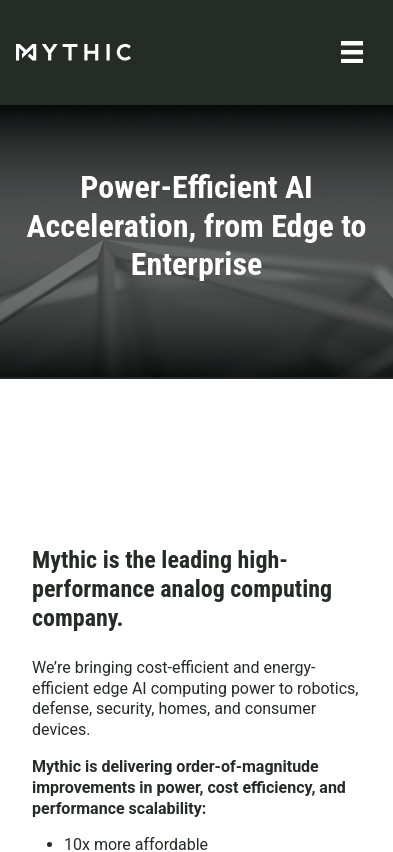
AI hardware solution focusing on edge computing to enable high-performance AI inference in low-power devices. Mythic focuses on AI hardware for edge computing to enable high-performance AI inference in low-power devices.
-
Key Focus Area: Mythic concentrates on providing power-efficient AI acceleration particularly at the edge, as well as on cloud platforms. Their emphasis is on enabling high-performance AI inference through their specialized analog computing technology, which is effective in applications that suffer from limitations due to high power consumption and computational inefficiency commonly associated with digital processors. Their products serve diverse markets such as intelligent machines, smart homes, AR/VR, drones, aerospace, and smarter cities.
-
Unique Value Proposition and Strategic Advantage:
- Analog Compute-in-Memory Technology: Mythic’s proprietary analog compute-in-memory architecture is at the core of their competitive advantage. Unlike traditional digital computing, their solutions store AI parameters within the processor, doing away with memory bottlenecks, thereby reducing energy consumption and enhancing speed.
- Power and Cost Efficiency: Their analog processors are noted for delivering similar computing capability as a GPU with as little as one-tenth of the power consumption and at much lower costs. This is positioned as a strategic advantage over digital counterparts, which face operational limits due to energy requirements and costs.
- Scalability and Flexibility: The design of the Mythic AMP allows deployments from small edge devices to data centers, offering flexibility and future-proofing for developers as demands for performance may increase.
- Delivery on Value Proposition:
- Product Offerings: Mythic’s key products, such as the M1076 Analog Matrix Processor, MM1076 M.2 M Key Card, and ME1076 M.2 A+E Key Card, integrate their analog computing technology into various applications that demand AI inference with low power consumption and high performance.
- Software Ecosystem Integration: They ensure compatibility with existing AI training frameworks like PyTorch and TensorFlow, simplifying integration with existing AI workflows. Their software stack optimizes and compiles neural networks, enhancing ease of adoption and performance.
- Market and Application Focus: Mythic targets diverse sectors including smarter cities for surveillance, intelligent machines for manufacturing efficiency, AR/VR environments for interactive experiences, and drones for secure data processing. By focusing on how their technology can be integrated seamlessly into these applications, they address industry-specific challenges such as latency reduction, cost efficiency, and system resilience.
Overall, Mythic positions its technology as a game changer for AI infrastructure, providing an efficient alternative to the incumbent digital AI processing methods, with a particular focus on reducing energy consumption while maintaining high computational performance.
Habana
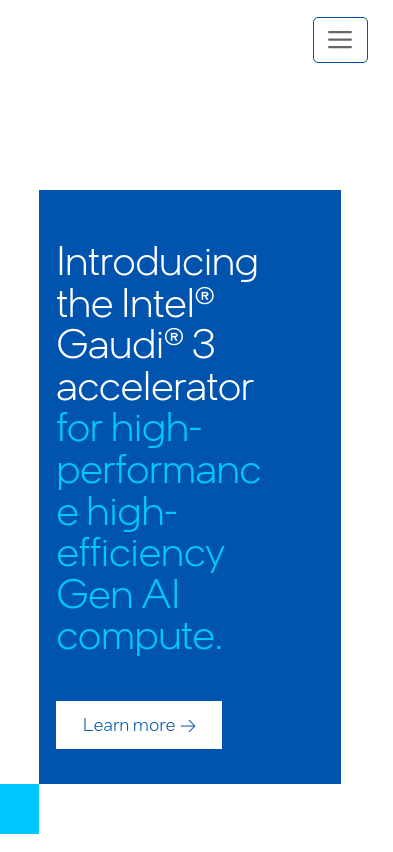
A leader in chip and semiconductor technology. A company that provides deep learning acceleration hardware and software that helps with high-performance computing and data center workloads.
About | About | About | About | About | About | About | About | About | About | About | About | News
Habana Labs, owned by Intel, primarily focuses on developing advanced AI accelerators, notably the Intel® Gaudi® series. These products are dedicated to enhancing performance and efficiency in AI computing, particularly for deep learning and generative AI applications.
Key Focus Area:
- The company's main focus lies in high-performance, cost-efficient AI accelerators tailored for training and inference of deep learning models. Their products are significant for industries including autonomous vehicles, healthcare, fintech, and retail that rely heavily on AI functionalities.
Unique Value Proposition and Strategic Advantage:
- Price-Performance Efficiency: Habana's Gaudi accelerators claim a significant edge in price-performance metrics, offering up to 40% better price-to-performance ratios than comparable Nvidia GPU solutions in some configurations.
- Scalability: The Intel Gaudi architecture includes features like integrated 100 GbE ports on every processor, enabling flexible and cost-effective scalability, a rare feature in AI chips that focuses on reducing total cost of ownership.
- Choice in AI Processing: By offering customisable hardware solutions such as air and liquid cooled versions, PCIe cards, and integrated server systems, Habana enables enterprises to choose configurations that suit their unique needs in terms of performance, scale, and power usage.
Delivery on Value Proposition:
- Hardware and Software Integration: Habana offers a comprehensive hardware-software ecosystem, making it easier to adopt and transition to their technology. Their software suite supports popular AI frameworks such as TensorFlow and PyTorch, streamlining the migration from existing GPU-based models.
- Cloud and On-Premise Deployment: The company positions its products for flexible deployment, allowing use within cloud environments (through partnerships with CSPs like AWS) and on-premises via setups from partners such as Supermicro.
- Developer Support and Community: Habana provides extensive resources for developers—such as tutorials, GitHub repositories, and community forums—which facilitate easier adoption and optimization of AI models on Gaudi processors, supporting both smooth transitions and innovations in AI model building.
Applications in Industry:
- Healthcare: AI for medical imaging analysis and diagnostic support has been a significant area, where Habana's technology aids in reducing R&D costs and speeding up research.
- Autonomous Vehicles: Gaudi processors support AI models in autonomous vehicle tech through efficient, scalable machine learning solutions.
- Financial Services: AI applications in fintech harness Habana processors to improve operational efficiencies in areas like customer service automation and real-time payment processing.
- Retail: In retail, AI-powered surveillance systems and inventory management are enhanced via Habana's solutions, enabling smart store technologies and checkout-free systems.
Overall, Habana Labs seeks to empower various industries with efficient, scalable AI solutions that are competitively priced, while providing flexible deployment options through their Gaudi AI processors and optimized software suite, embracing the growing needs of AI in enterprise applications.
Cogniac

Cogniac is a company focused on computer vision technology, offering a low-code AI platform that integrates with business operations to drive value from visual data. The company supports various industries including automotive, railway, manufacturing, safety and security, government, logistics, packaging, and partnerships with entities like Cisco Meraki.
-
Key Focus Area: Cogniac focuses on harnessing the power of artificial intelligence (AI) and computer vision technologies. The primary aim is to integrate these capabilities into various industrial sectors for enhanced performance and operational efficiency.
-
Unique Value Proposition and Strategic Advantage:
- Cogniac offers a low-code AI platform designed to drive value from visual data effectively and seamlessly into existing business infrastructures.
- The adaptability and scalability of their unique AI model allow multiple tasks to be executed simultaneously without the complexities of traditional computer vision platforms.
- Their strategy emphasizes continuous learning from imagery, which optimizes and refines performance as the platform is used.
-
How They Deliver on Their Value Proposition:
- Low-Code Platform: Cogniac's AI thrives on a platform that requires minimal coding, enabling even non-technical users to deploy and manage visual data analyses.
- Hyper Parameter Optimization: This technique allows Cogniac's AI to refine its models in real-time and adjust to variables quickly, reducing implementation time significantly.
- Agility and Scalability: The platform supports diverse deployment models across cloud and on-prem environments, providing flexibility for businesses to scale operations as required.
- Partnerships: By collaborating with organizations like Cisco Meraki, Cogniac leverages existing hardware systems to extend its computer vision capabilities. This enhances companies' data acquisition processes without major infrastructure changes.
- Diverse Industry Applications: Serving sectors like automotive, manufacturing, logistics, railway, and government, Cogniac addresses specific operational challenges through customized solutions, fostering enhanced safety, efficiency, and compliance across the board.
Overall, Cogniac positions itself as a versatile player in the AI landscape by adapting its offerings to fit the complex needs of various industries, emphasizing value creation from visual data through user-friendly and scalable technology solutions.
Wysdom.AI
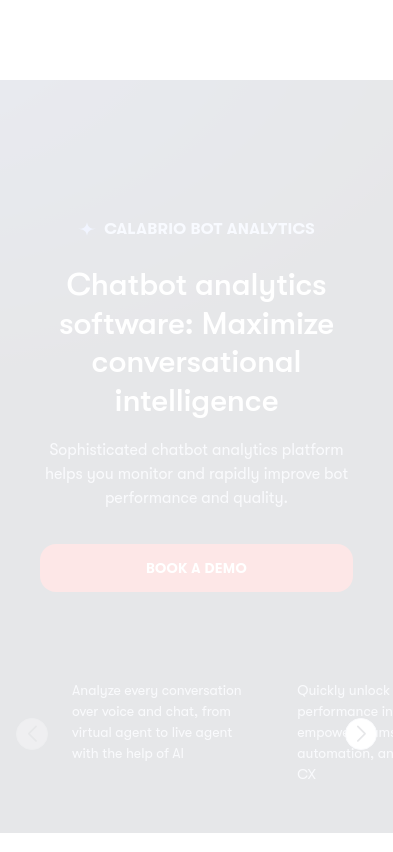
Wysdom.AI provides fully managed virtual agent operations to enhance customer satisfaction, revenue, and cost savings.
Calabrio is a company that positions itself in the contact center and customer service optimization sector, focusing primarily on enhancing workforce performance through data-driven solutions and insights. Its key focus lies in delivering integrated workforce optimization tools and advanced analytics to refine customer interaction and streamline operational efficiency for businesses across various sectors such as finance, healthcare, and utilities.
Unique Value Proposition and Strategic Advantage:
- Unified and Integrated Platform: Calabrio offers a comprehensive suite of tools under the Calabrio ONE platform, which is cloud-based and designed to optimize workforce management. This integration allows users to leverage multiple features from forecasting and scheduling to interaction analytics and call recording from a single platform.
- Chatbot and AI-Powered Insights: A significant aspect of its offering is its advanced bot analytics tools. These allow companies to deeply understand and improve chatbot and voice bot performances. By transforming raw interaction data into actionable insights, Calabrio enables enterprises to effectively scale their automation, enhance customer experiences, and realize cost efficiencies.
- Cross-Industry Solutions: The company's platform is designed to accommodate various business needs, illustrating flexibility with solutions tailored for different industries, such as finance, retail, and public sector organizations, thus broadening its market reach and adapting to varied operational challenges.
- Commitment to Data Security and Compliance: Calabrio emphasizes data integrity and compliance with privacy standards, which is a critical consideration for its clients, especially those in regulated industries like finance and healthcare.
Delivering on the Value Proposition:
- Data Accessibility and Centralization: Users are granted unprecedented access to a comprehensive array of interaction data across all customer touchpoints, including chat, voice bots, and live agent interactions. This centralization aids in identifying trends, performance gaps, and areas of improvement effectively.
- Comprehensive Analytics Tools: Calabrio's systems provide a broad spectrum of metrics, which include bot automation scores, cost per automated conversation, and agent experience scores. This detailed analysis helps businesses pinpoint efficiency opportunities and performance bottlenecks.
- Streamlined Insights for Continuous Improvement: By offering continuous insights through their analytics tools, Calabrio enables businesses to make informed decisions and implement improvements rapidly. The insights help organizations understand customer sentiment and refine operational strategies continuously over time.
- Partner and Integration Ecosystem: Calabrio supports a vast ecosystem of partnerships, including integrations with leading bot development platforms such as Google Dialogflow, Amazon Lex, and IBM Watson. This connectivity broadens their capability, allowing for seamless integration within existing client infrastructures.
In summary, Calabrio's focus on providing a unified and comprehensive technological suite, designed to enhance the operational efficiency and customer experience of contact centers, articulates its strategic advantage. By enabling detailed insights into bot performance and user interaction data, businesses can not only improve their service levels but also ensure scalability and adaptability within a rapidly evolving market space.
Axelera AI

Axelera AI specializes in AI acceleration for edge computing applications, with a platform called Metis for handling computer vision inference.
Axelera AI is primarily focused on delivering high-performance AI hardware acceleration solutions designed for edge computing. Their key focus areas include generative AI, computer vision inference, and making AI accessible and efficient across various markets, including security, retail, industrial, and automotive sectors.
Unique Value Proposition and Strategic Advantage:
-
AI Acceleration Hardware: Axelera AI's Metis platform, including AI Processing Units (AIPUs) and acceleration cards like PCIe and M.2, claims to deliver unprecedented performance with high throughput and low energy consumption.
-
Integrated Hardware and Software Solutions: The company's offer encompasses hardware paired with an easy-to-use software stack, the Voyager SDK, which simplifies the deployment of AI models. This combined offering emphasizes usability, power efficiency, and cost-effectiveness.
-
Digital In-Memory Computing Technology: Axelera AI prides itself on using Digital In-Memory Computing (D-IMC) and RISC-V dataflow architectures. This technology minimizes data movement between memory and compute units, supposedly overcoming traditional memory bandwidth constraints and power inefficiencies.
-
Partnership and Ecosystem: Collaborations with companies like Arduino aim to enhance the accessibility of AI at the edge. By leveraging Arduino’s open-source community and Axelera’s hardware acceleration, the partnership aims to democratize AI innovations for a broader audience.
Delivery on Value Proposition:
-
Product Offerings: The Metis Compute Board and Accelerator Cards provide comprehensive solutions for AI inference at the edge. These products aim to bridge the gap between cutting-edge AI technology and practical implementation by offering ready-to-deploy systems that require minimal additional development from users.
-
Cost and Power Efficiency: Axelera’s technology is touted as being significantly more energy-efficient and cost-effective compared to traditional AI solutions like GPUs. This is achieved through their specialized architecture and quantization techniques that enhance output without compromising accuracy.
-
Flexible and Scalable Platform: Through the Metis evaluation systems, Axelera AI caters to a wide array of applications, including video analytics and quality inspection, capable of handling multiple high-resolution video streams simultaneously. The scalability of the platform allows it to integrate seamlessly with existing systems, enhancing its practicality and future-proofing capabilities.
-
Strategic Geographic and Market Expansion: With significant investment backing, Axelera AI plans to broaden its market reach into North America, Europe, and the Middle East. This expansion strategy aims to support the growing demand for efficient AI solutions and support computing needs across various new application domains including automotive and digital health.
-
Client Engagement and Community Building: Through events, partnerships, and an online store, Axelera AI encourages engagement, offering personalized demonstrations of their technology to drive client and community uptake.
Axelera AI is positioning itself as a key player in the edge AI space, focusing on hardware that claims to deliver high efficiency and performance while addressing cost and power consumption challenges. Their strategic partnerships and planned expansions underscore a commitment to evolving with market demands and enhancing AI accessibility globally.
Cerebras Systems
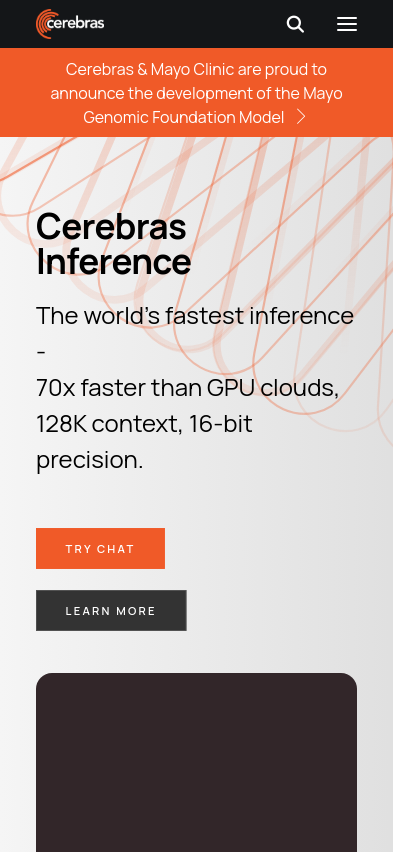
Cerebras is a computer systems company dedicated to accelerating deep learning. The pioneering Wafer-Scale Engine (WSE) – the largest chip ever built – is at the heart of our deep learning system, the Cerebras CS-1.
Leadership | About | ESG | About | About | Foundation | News
Cerebras Systems primarily focuses on developing and utilizing high-performance computing solutions to accelerate artificial intelligence (AI) and machine learning (ML) processes. Their mission is to address computational bottlenecks and facilitate advancements across numerous industries, including healthcare, pharmaceuticals, energy, government, and financial services. Cerebras achieves this through their innovative hardware and software solutions, notably their Wafer Scale Engine (WSE-3) and Cerebras AI supercomputers.
Unique Value Proposition and Strategic Advantage:
-
Wafer Scale Technology: Cerebras’ Wafer Scale Engine (WSE-3) is central to their strategic advantage. It is claimed to be the fastest AI processor available, providing unparalleled performance in terms of AI-optimized cores, memory speed, and on-chip bandwidth. This enables computational tasks that would traditionally require expansive, multi-server GPU setups to be accomplished within a single, compact system.
-
Efficiency and Speed: The company emphasizes their systems' ability to perform AI tasks significantly faster and more efficiently than conventional setups. For example, their platforms reportedly enable the training of large language models and execution of complex simulations much quicker than legacy systems, therefore reducing the time and resources needed for AI workloads.
-
Scalability and Flexibility: Cerebras offers a scalable and flexible solution that allows for the training and fine-tuning of large AI models. Their products are marketed as being easy to deploy and maintain, with the capacity to handle billions of parameters which is pivotal for expansive datasets and complex AI models.
Value Delivery:
-
Product Offerings: Cerebras provides a range of products including AI supercomputers, inference engines, and AI model services. These offerings are designed to cover various aspects of AI project lifecycles, from model training and deployment to inference.
-
Collaboration with Institutions: They partner with leading institutions, like the Mayo Clinic and Sandia National Laboratories, to tailor AI solutions that meet specific needs. For instance, their collaboration with Mayo Clinic focuses on developing genomic models for improved medical diagnostics and personalized treatment plans.
-
Industry Applications: Cerebras’ systems are applied in diverse fields such as healthcare for drug discovery, government for enhanced public sector services, and energy for seismic modeling, among others. This versatility underscores the breadth of their hardware's application in various complex computational scenarios.
-
Services and Support: Beyond hardware, Cerebras provides extensive support via documentation and developer resources to ensure optimized utilization of their technologies. They offer services to help companies quickly train state-of-the-art AI models tailored to specific business needs.
Cerebras Systems positions itself as an enabler of advanced AI capabilities by providing a robust hardware-software ecosystem, aiming to streamline and accelerate AI processes across industries through its proprietary technologies.
Kneron

Kneron develops an application-specific integrated circuit and software that offers artificial intelligence-based tools.
Kneron specializes in developing on-device edge artificial intelligence (AI) solutions. The company's primary focus is on creating hardware and software systems that enable AI processing directly on devices instead of relying on cloud computing. This approach facilitates faster processing times, enhances data privacy, and lowers costs for integration into various consumer and industrial applications.
Unique Value Proposition and Strategic Advantage:
- On-Device AI Processing: Kneron's core advantage lies in its ability to provide AI solutions that process data directly on the device. This reduces reliance on cloud resources, thus addressing privacy concerns since data remains on the device rather than being transmitted over the internet.
- Reconfigurable Technology: Kneron’s patented Neural Processing Unit (NPU) technology allows real-time adaptability for different recognition tasks, supporting audio, 2D, and 3D image recognition needs while being compatible with major AI frameworks.
- Energy Efficiency: Their AI System on Chip (SoC) solutions offer a balance between performance and power efficiency, which is particularly important for battery-powered and portable devices.
- Cost-Effectiveness: By integrating AI computation on devices, Kneron reduces the overall cost structure for device makers, lowering time-to-market barriers and providing customizable, low-cost solutions.
Delivery on Value Proposition:
- AI System on Chip (SoC): Kneron’s AI SoCs are integral to their delivery strategy, combining neural network-powered processing with high energy efficiency. These chips serve various applications, including smart homes, vehicles, and security devices.
- Edge AI Models: Kneron develops lightweight AI models optimized for power and performance. These models are specifically designed for edge applications where space and power are limiting factors.
- KNEO Platform: Their KNEO AI APP STORE and KNEO Stem modules empower developers to create and deploy AI applications with ease, heralding a new era of AI applications akin to mobile apps.
- Custom Solutions: Kneron tailors integrated hardware and software solutions that enable partners to expedite on-device edge AI deployment and optimize for specific use cases such as smart vehicles, security, and IoT apps.
- Education Initiatives: Kneron is committed to fostering AI literacy through partnerships with educational institutions, providing learning resources and a platform to engage students and developers in AI innovation.
Through these efforts, Kneron aims to make edge AI accessible and widespread, positioning itself as a key player in revolutionizing how AI applications are developed and deployed across different industries.
Axelera

Axelera is working to develop AI acceleration cards and systems for use cases like security, retail and robotics.
Key Focus Area
Axelera AI is dedicated to advancing AI technologies with a focus on edge computing solutions. Their primary industry application is in accelerating inferencing for computer vision tasks within edge devices. They aim to enable efficient, cost-effective, and high-performance AI solutions specifically tailored for applications in the security, retail, and industrial sectors, among others. This approach allows users to process data insights rapidly and efficiently without the constraints typically associated with traditional cloud-based AI systems.
Unique Value Proposition and Strategic Advantage
Axelera AI's distinctive advantage lies in their development of a comprehensive hardware and software ecosystem, specifically designed for edge AI applications. The heart of their offering is the Metis AI Processing Unit (AIPU) which utilizes proprietary Digital In-memory Computing (D-IMC) technology in conjunction with RISC-V architecture. This combination promises to deliver:
- High Performance and Efficiency: The Metis AIPU can achieve up to 214 TOPS, offering significant computational power while maintaining energy efficiency.
- Cost Effectiveness: By utilizing D-IMC and standard CMOS technologies, Axelera's solutions aim to be more cost-effective than traditional GPU-based alternatives.
- Scalability: Their hardware can be scaled and integrated into existing systems using familiar interfaces like PCIe and M.2, which facilitates ease of deployment and future-proofing for users.
Delivering on Value Proposition
Axelera AI fulfills its pledge to provide cutting-edge AI acceleration through several initiatives:
-
Technological Innovation: Their Metis AIPU and the accompanying Voyager SDK offer an integrated hardware-software solution that simplifies deploying AI models on edge devices. The D-IMC technology ensures high computational efficiency while reducing power consumption.
-
Ecosystem Partnerships: Collaborations with established platforms such as Arduino expand the accessibility and applicability of their AI solutions. These partnerships aim to integrate high-performance AI capabilities into a broader range of devices and applications.
-
Product Offerings: Axelera provides hardware options, including evaluation kits and AI acceleration cards, that simplify the integration of AI into existing infrastructure, thus reducing both time-to-market and operational costs for end users.
-
Application Versatility: Their solutions are suitable for multiple applications such as multi-channel video analytics, safety monitoring, and real-time operational intelligence, enabling a diverse range of industries to leverage AI efficiently.
-
Sustainability Focus: Axelera AI promotes running high-performance AI applications on-device, reducing dependency on power-intensive cloud solutions and contributing to lower carbon emissions.
In sum, Axelera AI strategically positions itself to accelerate AI innovation, empowering industries to deploy efficient edge AI applications with reduced cost and energy consumption while maintaining significant computational capability.
Liquid AI

Liquid AI focuses on developing advanced, general-purpose AI systems that align with human values and trustworthiness.
Liquid AI, an MIT spin-off based in Boston, primarily focuses on developing general-purpose AI systems that are capable, efficient, and scalable. Their efforts are centered around creating AI foundation models that leverage innovative architectures and theoretical foundations in machine learning, signal processing, and numerical linear algebra.
Key Focus Area: Liquid AI's main focus is the development of general-purpose AI systems through its Liquid Foundation Models (LFMs). These models are structured to handle various forms of sequential data across numerous industries, including financial services, biotechnology, and consumer electronics. Their LFMs, notably the LFM-7B, are designed to provide comprehensive AI functionalities that are both energy and memory efficient.
Unique Value Proposition and Strategic Advantage:
- Innovation in AI Architecture: Liquid AI emphasizes a shift from traditional transformer-based models, such as GPTs, to their own non-transformer-based architectures. This pivot reportedly allows their models to be highly efficient, offering superior performance with reduced computational demands.
- Multilingual and Multi-modal Capabilities: Liquid AI asserts that its LFMs excel in multiple languages, including English, Arabic, and Japanese, and are adaptable to various industry-specific applications.
- Low Memory Footprint: The architecture of LFMs ensures a minimal memory footprint, which is posited to lead to cost-efficiency in deployment and tuning processes.
- Strategic Collaborations and Funding: Liquid AI has garnered a significant $250M Series A funding primarily led by AMD Ventures, alongside collaborations with influential entities like Capgemini and ITOCHU, to scale their products and penetrate various markets effectively.
How They Deliver on Their Value Proposition:
- Model Deployment and Customization: Liquid AI offers models that can be finely tuned and deployed directly on-premises or on edge devices. Through their Liquid Engine, they provide high-performance AI solutions that are claimed to adapt to enterprise-specific needs with reduced latency and enhanced privacy.
- Comprehensive Model Stacks: The LFMs come with integrated inference and customization stacks that allow enterprises to adapt the technology for private, secure, and specific use cases.
- AI Integrated Platforms: Their products are available for trial and integration through several accessible platforms, such as Amazon Bedrock and the Liquid Playground, aiming to make LFMs versatile and easy to access for development teams.
- Rapport with Strategic Partners: They actively work on creating AI solutions in collaboration with partners, like their joint projects with Capgemini to develop new capabilities in AI domains such as edge solutions and enterprise AI transformations.
Liquid AI seems to position itself as a forerunner in the transition to advanced, efficient AI models tailored for broad applications, purporting to reduce carbon footprints associated with traditional AI infrastructure and facilitate easier deployment and customization for enterprises. Nonetheless, it's important to recognize these claims as part of a marketing narrative.
Abacus.AI
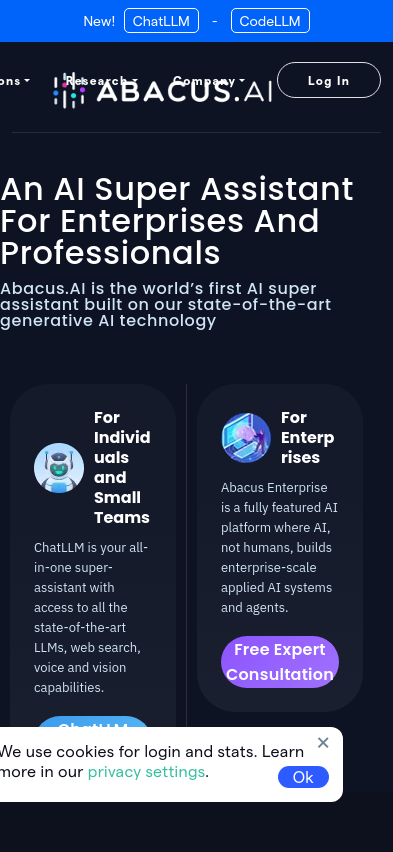
Abacus.AI enables businesses to implement AI without needing expert developers by offering pre-trained models for tasks like customer service and forecasting. Abacus.AI offers pre-trained models for business tasks like customer service, simplifying AI implementation without expert developers.
News | About | About | About | About | About | About | About | About | About | About | About | About | About | Vision/Values | About | Vision/Values | About | About | About | About | About | About | About | About | About | About | About | About | About | About | About | About | About | About | About | About
-
Company's Key Focus Area: Abacus.AI is primarily focused on providing AI-driven solutions tailored for both individual professionals and large enterprises. Their main goal is to automate and enhance business processes through the use of AI technology. This includes a broad range of applications, such as predictive modeling, personalization, anomaly detection, and AI-based decision-making tools. They offer platforms and tools to build AI agents and chatbots, optimize resources through discrete optimization, and utilize vision AI for modeling tasks.
-
Unique Value Proposition and Strategic Advantage: Abacus.AI positions itself as an AI super-assistant that leverages generative AI technology to automate various business processes. Their strategic edge lies in their state-of-the-art AI capabilities, including structured machine learning, vision AI, and personalized solutions, along with a commitment to open-source generative AI models. They claim that their AI systems can enhance productivity and efficiency by automating complex tasks and reducing human intervention.
-
Delivery on Their Value Proposition: To deliver on its value proposition, Abacus.AI employs:
-
AI Super Assistants: Tools like ChatLLM and CodeLLM are designed to integrate AI capabilities across platforms, providing services like web search, image generation, and code editing.
-
Comprehensive AI Platform: For larger organizations, they offer a platform capable of building enterprise-scale AI systems, using AI to create and manage other AI agents and processes. This platform aims to automate tasks such as fraud detection, contract analysis, and personalized marketing.
-
Structured ML and Predictive Modeling: Abacus.AI provides tools to create machine learning models tailored to specific data inputs, ensuring accurate business predictions and process optimizations.
-
Vision AI and Optimization: These services offer advanced solutions for image analysis and optimizing business processes under given constraints, aimed at reducing costs and increasing efficiency.
-
Integration and Customization: The company offers integration with existing data systems, allowing for customization and personalized setups that fit specific business needs and enable contextual AI interactions.
-
Consultation and Support: They provide consultations to help enterprises tailor the AI solutions to their specific requirements and offer support throughout the implementation process.
-
Overall, their approach focuses on using cutting-edge AI models and deep learning techniques to build custom solutions that improve business process efficiency and decision-making.
NVIDIA

NVIDIA is a leading producer of AI hardware, renowned for its GPUs and plays a pivotal role in the AI chip market, being a revenue and volume leader.
-
Key Focus Area: NVIDIA's primary focus is on accelerated computing technology designed to power artificial intelligence (AI) and other computationally intensive tasks across various sectors. They cater to industries such as healthcare, automotive, gaming, manufacturing, and more, capitalizing on their hardware and software capabilities to optimize AI and data processing workloads.
-
Unique Value Proposition and Strategic Advantage: NVIDIA distinguishes itself by offering cutting-edge hardware like GPUs and AI supercomputers, and supporting software platforms that enable efficient AI computation and application. Their strategic advantage lies in the development of tailor-made solutions such as NVIDIA RTX, the Omniverse platform for 3D workflows and collaborative design, and cloud-based AI services. NVIDIA’s partnerships with key tech giants like Microsoft and Google for AI and data processing enrich their service offering, enabling comprehensive solutions for enterprise AI needs.
-
How They Deliver on Their Value Proposition:
-
Product Range: The company offers a wide spectrum of products, including GeForce graphics cards for gaming, the DRIVE platform for autonomous vehicles, and the DGX platform for AI training. Their offerings extend to software, such as the AI Enterprise suite and specialized AI tools for various industries.
-
Platform Initiatives: NVIDIA advances AI applications through initiatives like Project DIGITS, allowing local and cloud-based AI computational tasks, and Cosmos, which accelerates AI development for physical systems like robotics and autonomous vehicles. Their efforts in the metaverse, through the Omniverse platform, demonstrate their commitment to virtual simulation and 3D development.
-
Innovative Solutions: NVIDIA emphasizes high-performance computing (HPC) with solutions like CUDA-based parallel computing and deep learning frameworks that enhance scientific research and design processes. Their focus on delivering AI tools for sectors like healthcare and entertainment showcases their ability to impact diverse fields.
-
Collaborations and Partnerships: They strategically align with industry leaders such as Microsoft, Google, and Oracle to integrate their technologies into broader enterprise ecosystems. These collaborations enhance NVIDIA's reach and influence in deploying scalable AI solutions.
-
Training and Support: NVIDIA supports the adoption of its technologies through extensive resources, including technical training, support for developers, and comprehensive solution catalogs that facilitate easier implementation of their platforms and products.
-
These strategic initiatives enable NVIDIA to maintain its position in advancing AI capabilities and catering to an increasingly digital-first world, impacting industries by solving complex computational problems and innovating upon AI-driven solutions.
AMD

AMD is a key player in the AI hardware market, holding the position as the second player in market valuation, offering competitive chips like the MI350.
-
Key Focus Area: AMD primarily focuses on designing and manufacturing semiconductor products. Their key focus is on processors for various computing needs, including high-performance CPUs and GPUs for both personal and business use. They target multiple sectors such as gaming, data centers, personal computers, and professional workstations, emphasizing AI integrations into their product offerings.
-
Unique Value Proposition and Strategic Advantage: AMD positions itself as a provider of high-performance computing solutions that seamlessly integrate AI capabilities. The company markets its Ryzen™ processors as the first x86 processors with dedicated AI engines, claiming to bring advanced AI functionalities directly to PCs. This integration allows for local AI processing, enhancing privacy and security, which AMD considers a strategic advantage over cloud-dependent AI solutions. AMD emphasizes leadership in power efficiency and processing speed, presenting AMD Ryzen™ and EPYC™ processors as optimized for enterprise-grade performance with security and manageability features built-in.
-
Delivery on Value Proposition: AMD delivers on its value proposition by incorporating AI engines and adaptive SOCs into its processors, enabling users to manage intensive computational workloads and AI-enhanced tasks locally. They provide a comprehensive suite of processors that are optimized for specific industries—from gaming and high-performance computing to AI-driven business solutions and media production. AMD also collaborates with major OEMs and partners to ensure that their processors are widely available in consumer and enterprise products, promoting seamless integration. Additionally, they offer an extensive software ecosystem, including ROCm™ and professional management tools, to enhance the capabilities and integration of their hardware solutions. Product stability, long-term availability, and enhanced security are actively highlighted as essential features that meet business and industrial demands. Through strategic partnerships and a commitment to innovation in AI and processing technology, AMD aims to support and advance enterprise workflows comprehensively.
Intel
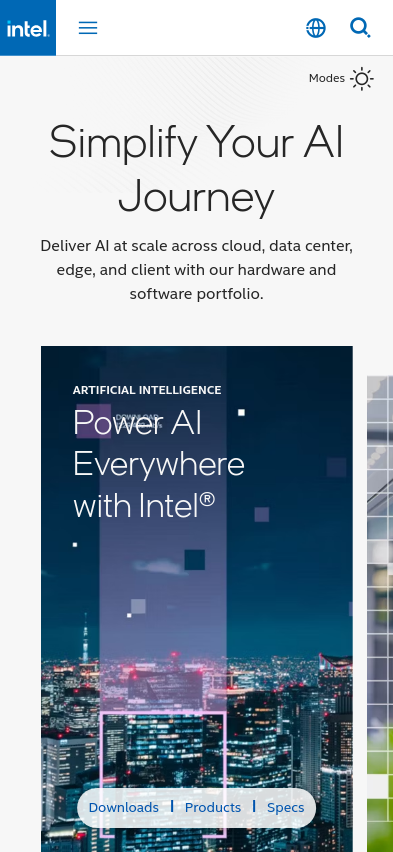
Intel is a market leader in CPUs, expanding its influence in the AI sector with products like the Gaudi 3 chip, aiming to catch up in the GPU arena.
Leadership | About | About | Leadership | About | About
Intel's Strategic Focus and Deliverables
1) Key Focus Area:
Intel is highly focused on Artificial Intelligence (AI) innovation across various industries and technological platforms. Their efforts span from traditional areas like processors and computing hardware to cutting-edge solutions that integrate AI across data centers, cloud computing, and enterprise systems.
2) Unique Value Proposition and Strategic Advantage:
- Open Platform for Enterprise (OPEA): Intel provides a comprehensive AI ecosystem that includes silicon, software, and tools, allowing enterprises to harness AI's potential across devices from PC to edge and data centers. This strategy is aimed at various industries, including financial services, manufacturing, healthcare, and retail.
- AI-Powered Performance: Their newest product offerings, such as the Intel® vPro® PCs and Core™ Ultra processors, are tailored to enhance productivity with integrated AI capabilities, improving everything from security to computing efficiency.
- Scalability and Edge Solutions: Intel's platforms, such as the Tiber™ AI Cloud, are designed to streamline the deployment of AI solutions at an enterprise scale and across edge environments.
- Enterprise Solutions: Intel underscores the capability of their systems to glean actionable insights from data, driving automation and enhancing decision-making processes, which serves as a significant business advantage to clients.
3) Delivering on the Value Proposition:
- Comprehensive Product Portfolio: Intel offers a wide range of products including processors (Intel® Core™ Ultra and Intel® Xeon®), graphics solutions with their Arc™ series, and AI accelerators, which support AI workload demands.
- Tools and Partnerships: With resources like the OpenVINO™ toolkit for AI model optimization and the oneAPI Toolkits for unified programming, Intel caters to developers seeking efficiency and innovation. They also leverage extensive partnerships for joint solutions and industry standards.
- Enhanced Security and Manageability: Intel platforms focus on security with hardware-level protections and remote management capabilities, critical for enterprise environments.
- Empowering the Workforce: Solutions like Intel vPro® are aimed at fortifying businesses with robust security tools and optimizing device management, thus allowing tech teams to focus more on innovation than maintenance.
- Development Resources: Through its Developer Zone and resources, Intel promotes easy access to its software tools and solutions that support innovation, scalability, and performance optimization. This aids developers in crafting solutions easily across various technology stacks.
- Evidence of Impact: Intel documents case studies, such as those with financial and agriculture sectors, demonstrating their AI solutions achieving significant efficiency improvements and cost reductions.
Final Thoughts:
Intel continues to strategically position itself as a provider of diverse technological platforms and solutions, placing special emphasis on AI innovations. By emphasizing scalable and secure solutions supported by a robust hardware and software ecosystem, Intel aims to not only meet but guide the evolving demands of enterprise-level computing and AI applications.
Unify AI

Unify revolutionizes AI deployment by merging open source and proprietary tools for fast pipelines, ensuring optimal performance across various tasks.
Unify.ai Company Overview
1) Key Focus Area: Unify.ai concentrates on optimizing the use of Large Language Models (LLMs) for application development. The company aims to provide solutions that simplify the integration and deployment of these models, specifically targeting improved quality, cost efficiency, and speed.
2) Unique Value Proposition and Strategic Advantage: Unify offers a platform that integrates various LLMs from different providers into a single API, making it easier for developers to access and leverage the strengths of multiple models. This approach capitalizes on providing more efficient and cost-effective AI application solutions compared to using a single model. The strategic advantage lies in the reduction of complexity and overhead associated with managing multiple LLMs, enabling developers to switch between them to optimize for specific tasks.
3) How They Deliver on Their Value Proposition:
- Integrated Access: Through a single API, developers can access all available LLMs across providers, simplifying the integration process and allowing easier experimentation with different models.
- Customization: The platform allows for personalized configurations to tailor performance in terms of speed, cost, and quality based on specific user needs.
- Optimization Tools: Live dashboards and transparent benchmarks are provided to objectively compare LLMs, ensuring users can select the best possible model combinations.
- Routing Technology: Unify’s routing technology helps direct requests to the optimal LLM based on evolving model capabilities, thus enhancing efficiency and reducing costs.
- Collaboration and Prototyping: They offer tooling for developers to build their workflows rapidly, ensuring rapid prototyping and iteration.
Unify has positioned itself as a pivotal resource within the LLM ecosystem, providing a centralized platform for accessing, comparing, and optimizing various AI models. This service is aimed primarily at developers who face the challenge of navigating the complex and rapidly growing landscape of AI models.